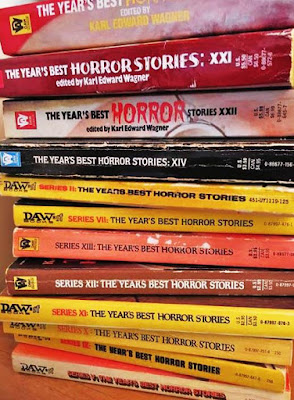During this era, many paperback anthologies still included "dark fantasy" under the rubric of horror (DAW Books was a science fiction/fantasy publisher). "Dark fantasy" means to me fantasy, of course, but with major elements of the macabre and grotesque, with a fair amount of violence, usually with a medieval or mythic atmosphere and setting. The language too is often archaic, formal, stilted even. There may be sword 'n' sorcery going on as well. A few years later, Charles L. Grant used that term "dark fantasy" to describe his own stories and novels of subtle modern unease, but I prefer "quiet horror" for his brand of fiction. I say all this to simply state I'm not a fan of this kind of dark fantasy, and feel I don't quite have the critical acumen to judge dark fantasy. I tend to skim stories in that vein.
In Series VII, four stories fit this subgenre: "Amma" by Charles Saunders (above), "The Secret" by Jack Vance, "Divers Hands" by Darrell Schweitzer, and "Nemesis Place" by David Drake. I was unfamiliar with Saunders but liked well enough his West African griot's tale of a woman's unlikely secret identity; its comfortable switch-up ending evokes fables we first heard in childhood. Vance's story of Pacific islanders who know, unconsciously, that to leave their home is to encounter a strange wide world the knowledge of which may not be welcome. Again, something like a child's tale.
Schweitzer (above), well-known as a critic and editor of genre fiction, contributes a longish work never before published. Knights, horses, swords, chainmail, maidens... no thanks. But Schweitzer writes strong prose, knows his way around violence and creeping dread, so I think "Divers Hands" will appeal greatly to those whose appreciation of such works is greater than mine. Drake's "Nemesis Place" contains the phrase "trader in spices" and that pretty much was quits for me, though I read the last paragraph and it seemed pretty bloody, so cool I guess.
Anyway, on to the real horrors.
An early work from one of the 1980s greats, Dennis Etchison, "The Pitch" is a pitch-black bit of unexpected vengeance by a kitchen cutlery salesman. Ouch. Etchison is a master of the modern convenience and its impact on our lives. "The Night of the Tiger" is a very minor work from Stephen King; it appeared in neither of his classic collections Night Shift and Skeleton Crew. King's authorial voice is strong, and the circus setting is convincing, but the final twist is rote. I however enjoyed the relaxed charms of Manly Wade Wellman's tale of a lovely vampire lady, "Chastel."
Ah, I forgot that the fine "Sleeping Tiger" from Tanith Lee (above) is also dark fantasy: a Brave Prince named Sky Tiger happens upon two lovelies in the forest named Orchid Moon and Lotus Moon. They bring him to a tower and perhaps promise paradise; Venerable Priest appears and puts the kibosh on that. That final twist is impolitic. "Intimately, with Rain" is Janet Fox's modern fable of ancient guilt. Love the ending for this one, even if I've read and seen it elsewhere.
The two final tales are, I feel, the best of the lot: superb in style and sensibility, "Collaborating" by Michael Bishop and "Marriage" by Robert Aickman (above) offer the very best in genre fiction. The former is a kind of Cronenbergian medical horror story written with taste and steely-eyed insight (We gave them stereophonic sweet nothings and the nightmares they couldn't have by themselves); I don't want to spoil it for first-time readers. The latter is another of Aickman's precisely-penned tales of daily English life and the traps it holds in store for those who attempt to go against it (He glared brazenly at the universe). Fantastic works, and two of the best short stories I've read this year.
Editor Gerald W. Page was involved with Year's Best Horror Stories for several years. In his intro he rightly states "You never know where a good imaginative story will take you, whether it's science fiction, fantasy or horror..." and notes that good writing is just good writing. That's true, certainly, but good writing isn't my only criteria; I find I prefer my horror to be generally modern. But that's between me and me, and I think many other readers will find Series VII a worthwhile addition to their shelves of horror fiction...


























